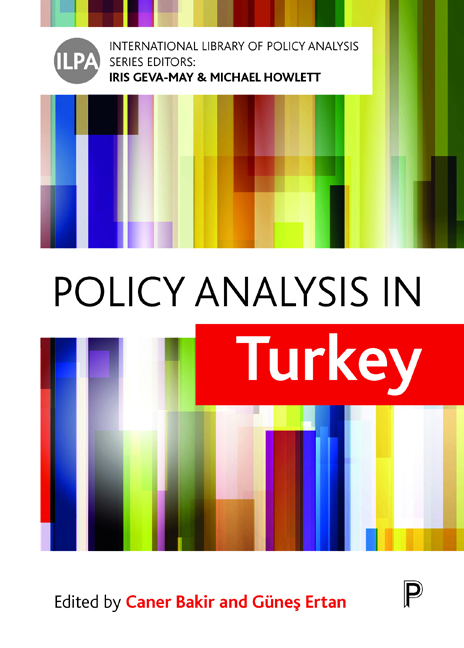Book contents
- Frontmatter
- Contents
- List of tables and figures
- Notes on contributors
- Editors’ introduction to the series
- one Pushing the pendulum from politics to policy: the state of policy analysis in Turkey
- Part One Historical roots, styles and methods of policy analysis in Turkey
- Part Two Policy analysis by governments
- Part Three Experts, international actors and public opinion
- Part Four Parties and civil society-based policy analysis
- Part Five Academic, bureaucratic and advocacy-based policy analysis
- Index
four - Methods of policy analysis: the US and Turkish cases
Published online by Cambridge University Press: 19 April 2022
- Frontmatter
- Contents
- List of tables and figures
- Notes on contributors
- Editors’ introduction to the series
- one Pushing the pendulum from politics to policy: the state of policy analysis in Turkey
- Part One Historical roots, styles and methods of policy analysis in Turkey
- Part Two Policy analysis by governments
- Part Three Experts, international actors and public opinion
- Part Four Parties and civil society-based policy analysis
- Part Five Academic, bureaucratic and advocacy-based policy analysis
- Index
Summary
Introduction
Policy sciences, public policy studies and policy analysis are relatively new subjects to Turkish academia, even though there have been several studies on public policies in different disciplines ranging from political science and public administration to economics, from law to sociology, and from public finance to business administration. Yet these studies often lack any policy science and/ or policy analysis perspective. There is also not much research examining and classifying the types of issues covered or policy research and analysis methods (quantitative or qualitative) used in those studies. Despite some encouraging developments, especially since the 2000s, regarding public policy studies and an increasing number of courses and textbooks on public policy in Turkey, the literature on public policy research and analysis is still quite limited. In fact, no methodology books are exclusively dedicated to policy research in the Turkish literature other than a few methodology books that include direct reference to the policy sciences (Baydar et al, 2008; Keser Ashenberger, 2015; Sert, 2015) and some general research textbooks covering some examples of qualitative research techniques applicable to policy studies and analysis (Yıldırım and Şimşek, 2000; Kuş, 2012; Aziz, 2014).
This chapter is dedicated to discussing the current status of policy analysis and research in general, in both the US and in Turkey. Such a discussion is closely dependent on the definition of policy analysis as well as the differences between the two cases. A broader definition of policy analysis would lead to a consideration of a large number of policy issues, policy analysis and research techniques. If policy analysis is defined as ‘applied social and scientific research pursued by government officials, non-governmental organisations, specialists or academics’, and ‘usually directed at designing, implementing, and evaluating existing policies, programs, and other specific courses of action adopted or contemplated by states or governments’ (Howlett and Ramesh, 2003, cited in Geva-May and Maslove, 2006, p 433), then a broader approach to policy research and analysis methods and techniques must be taken.
- Type
- Chapter
- Information
- Policy Analysis in Turkey , pp. 51 - 66Publisher: Bristol University PressPrint publication year: 2018



